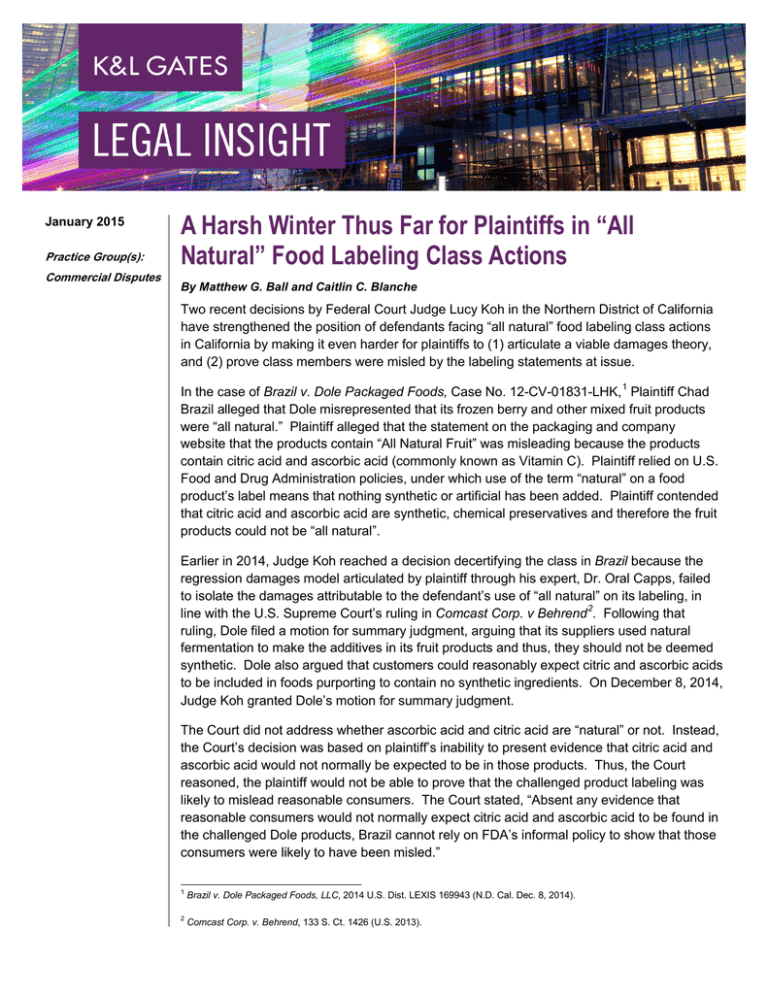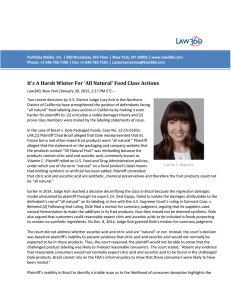
January 2015
Practice Group(s):
Commercial Disputes
A Harsh Winter Thus Far for Plaintiffs in “All
Natural” Food Labeling Class Actions
By Matthew G. Ball and Caitlin C. Blanche
Two recent decisions by Federal Court Judge Lucy Koh in the Northern District of California
have strengthened the position of defendants facing “all natural” food labeling class actions
in California by making it even harder for plaintiffs to (1) articulate a viable damages theory,
and (2) prove class members were misled by the labeling statements at issue.
In the case of Brazil v. Dole Packaged Foods, Case No. 12-CV-01831-LHK, 1 Plaintiff Chad
Brazil alleged that Dole misrepresented that its frozen berry and other mixed fruit products
were “all natural.” Plaintiff alleged that the statement on the packaging and company
website that the products contain “All Natural Fruit” was misleading because the products
contain citric acid and ascorbic acid (commonly known as Vitamin C). Plaintiff relied on U.S.
Food and Drug Administration policies, under which use of the term “natural” on a food
product’s label means that nothing synthetic or artificial has been added. Plaintiff contended
that citric acid and ascorbic acid are synthetic, chemical preservatives and therefore the fruit
products could not be “all natural”.
Earlier in 2014, Judge Koh reached a decision decertifying the class in Brazil because the
regression damages model articulated by plaintiff through his expert, Dr. Oral Capps, failed
to isolate the damages attributable to the defendant’s use of “all natural” on its labeling, in
line with the U.S. Supreme Court’s ruling in Comcast Corp. v Behrend 2. Following that
ruling, Dole filed a motion for summary judgment, arguing that its suppliers used natural
fermentation to make the additives in its fruit products and thus, they should not be deemed
synthetic. Dole also argued that customers could reasonably expect citric and ascorbic acids
to be included in foods purporting to contain no synthetic ingredients. On December 8, 2014,
Judge Koh granted Dole’s motion for summary judgment.
The Court did not address whether ascorbic acid and citric acid are “natural” or not. Instead,
the Court’s decision was based on plaintiff’s inability to present evidence that citric acid and
ascorbic acid would not normally be expected to be in those products. Thus, the Court
reasoned, the plaintiff would not be able to prove that the challenged product labeling was
likely to mislead reasonable consumers. The Court stated, “Absent any evidence that
reasonable consumers would not normally expect citric acid and ascorbic acid to be found in
the challenged Dole products, Brazil cannot rely on FDA’s informal policy to show that those
consumers were likely to have been misled.”
1
Brazil v. Dole Packaged Foods, LLC, 2014 U.S. Dist. LEXIS 169943 (N.D. Cal. Dec. 8, 2014).
2
Comcast Corp. v. Behrend, 133 S. Ct. 1426 (U.S. 2013).
A Harsh Winter Thus Far for Plaintiffs in “All Natural” Food Labeling
Class Actions
Plaintiff’s inability in Brazil to identify a triable issue as to the likelihood of consumer
deception highlights the difficulty faced by plaintiffs generally in proving the merits of such a
claim. All Mr. Brazil offered was his understanding that all of the contents, not just the fruit,
were “all natural”. The Court decided that testimony, without more, would be insufficient to
meet his burden of proof. Although the Court acknowledged that surveys and expert
testimony regarding consumer expectations are not essential elements of a plaintiff’s
California consumer fraud claim, “a few isolated examples of actual deception are
insufficient” (citing Clemens v. DaimlerChrysler Corp., 534 F.3d 1017, 1026 (9th Cir. 2008)).
Although not explicitly required, it is difficult to imagine how a plaintiff could meet its burden
without a survey of consumers. After all, the plaintiff’s burden is to establish that a
reasonable consumer would not normally expect an ingredient (here, ascorbic acid and citric
acid) to be in a product. The Brazil ruling marks the first time a judge has made a decision on
the merits in an “all natural” labeling case and sets a high standard for evidentiary proof.
One week later, Judge Koh decertified a class of purchasers of certain almond milk products,
affirming the high bar already in place (as affirmed in Brazil) for plaintiffs attempting to
articulate an accurate damages model. In Chris Werdebaugh v. Blue Diamond Growers,
Case No. 5:12-cv-02724 3, the plaintiff claimed Blue Diamond violated California’s Unfair
Competition and False Advertising Law by using the terms “All Natural” and “evaporated
cane juice” on its almond milk packaging. The Court had previously certified a damages
class of California purchasers. At that time, Dr. Oral Capps, who was also Werdebaugh’s
expert, proposed three different damages models, two of which the Court rejected. The
methodology the Court found acceptable under Comcast was a regression model that,
according to plaintiff, would calculate the portion of the product’s price attributable to the
allegedly false claims.
In Blue Diamond’s motion to decertify the class, it argued that the plaintiff’s methodology
included price premiums related to other aspects of the product such as brand loyalty,
advertising, seasonality, region, and distribution channels. Plaintiff submitted a supplemental
expert report that attempted to cure the issues identified by the same Court’s decision in
Brazil. Ultimately, however, the Court reached a decision consistent with its decision in
Brazil; the Court concluded that Dr. Capps’ new report conflated the value of the Blue
Diamond brand name with the value associated with the “All Natural” and “evaporated cane
juice” labeling, and that the model used was not capable of isolating the value of the labeling
statements alone.
The Werdebaugh and Brazil decisions reaffirm the impact of Comcast and the flaws in
regression analyses, but more broadly, illustrate the difficult road ahead for plaintiffs seeking
to advance “all natural” labeling claims past the class certification stage.
3
Werdebaugh v. Blue Diamond Growers, 2014 U.S. Dist. LEXIS 173789 (N.D. Cal. Dec. 15, 2014).
2
A Harsh Winter Thus Far for Plaintiffs in “All Natural” Food Labeling
Class Actions
Authors:
Matthew G. Ball
matthew.ball@klgates.com
+1.415.249.1014
Caitlin C. Blanche
caitlin.blanche@klgates.com
+1.949.623.3526
Anchorage Austin Beijing Berlin Boston Brisbane Brussels Charleston Charlotte Chicago Dallas Doha Dubai Fort Worth Frankfurt
Harrisburg Hong Kong Houston London Los Angeles Melbourne Miami Milan Moscow Newark New York Orange County Palo Alto Paris
Perth Pittsburgh Portland Raleigh Research Triangle Park San Francisco São Paulo Seattle Seoul Shanghai Singapore Spokane
Sydney Taipei Tokyo Warsaw Washington, D.C. Wilmington
K&L Gates comprises more than 2,000 lawyers globally who practice in fully integrated offices located on five
continents. The firm represents leading multinational corporations, growth and middle-market companies, capital
markets participants and entrepreneurs in every major industry group as well as public sector entities, educational
institutions, philanthropic organizations and individuals. For more information about K&L Gates or its locations,
practices and registrations, visit www.klgates.com.
This publication is for informational purposes and does not contain or convey legal advice. The information herein should not be used or relied upon in
regard to any particular facts or circumstances without first consulting a lawyer.
© 2015 K&L Gates LLP. All Rights Reserved.
3



![[2012] NZEmpC 75 Fuqiang Yu v Xin Li and Symbol Spreading Ltd](http://s3.studylib.net/store/data/008200032_1-14a831fd0b1654b1f76517c466dafbe5-300x300.png)
